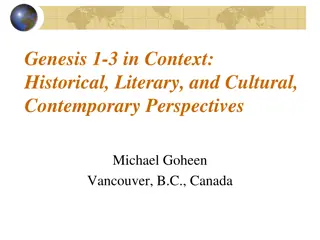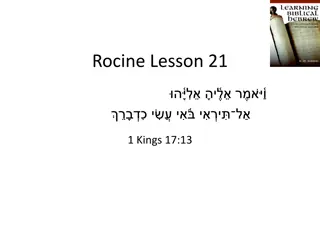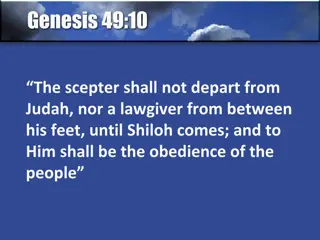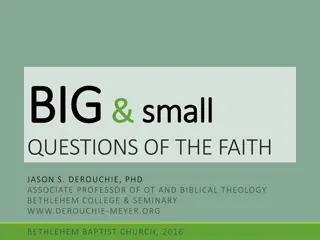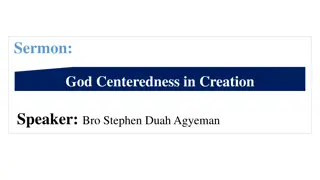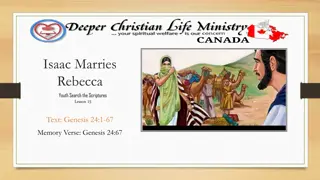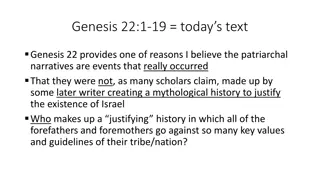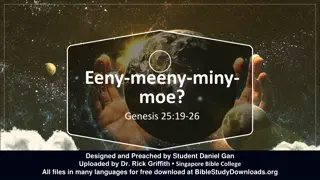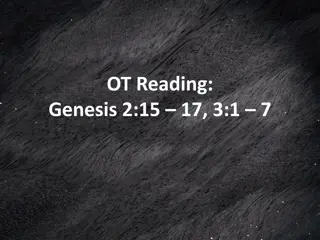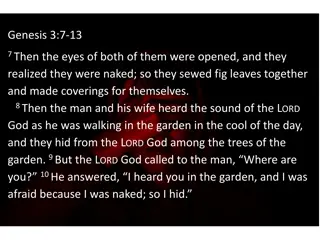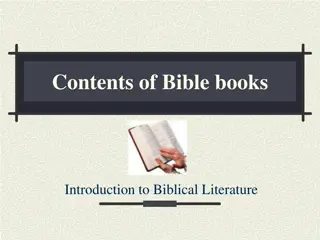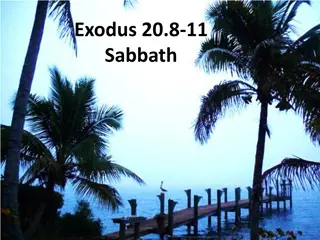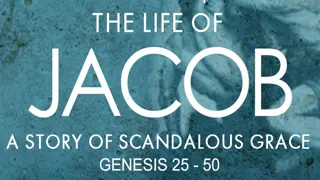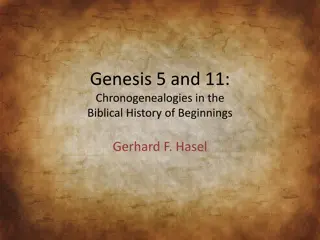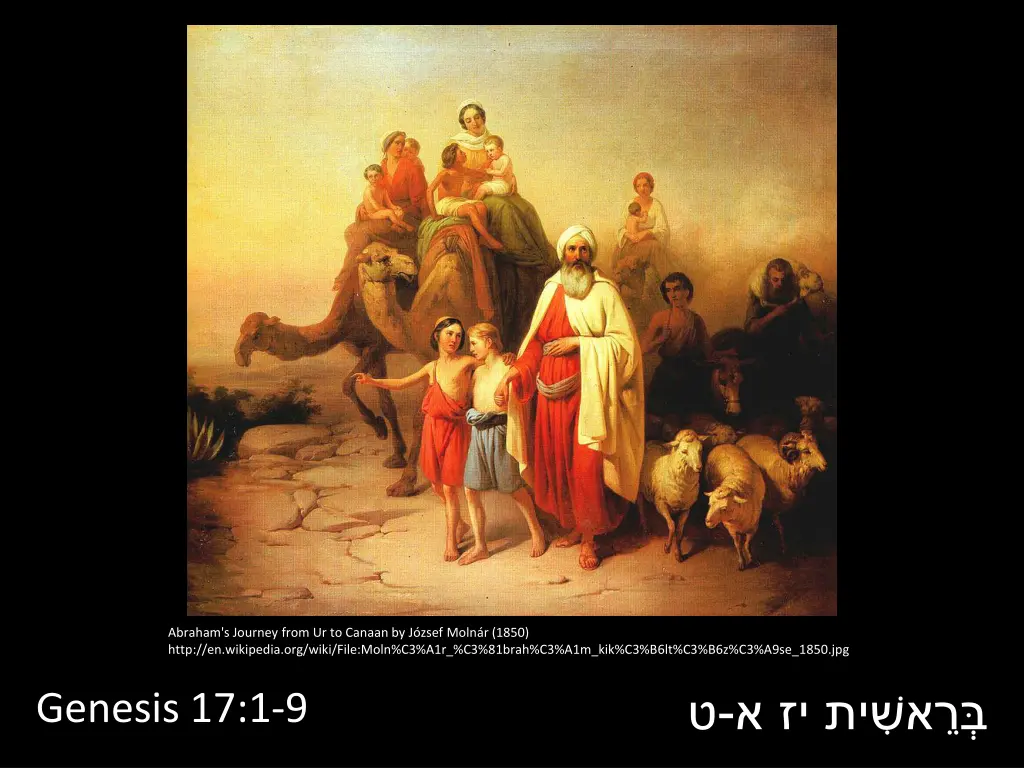
Abraham's Journey from Ur to Canaan by Jzsef Molnr (1850) - Genesis Images
Explore a collection of images depicting Abraham's journey from Ur to Canaan in the artwork of Jzsef Molnr (1850), along with related verses from Genesis. Discover the visual representation of this biblical narrative through a series of captivating illustrations.
Download Presentation

Please find below an Image/Link to download the presentation.
The content on the website is provided AS IS for your information and personal use only. It may not be sold, licensed, or shared on other websites without obtaining consent from the author. If you encounter any issues during the download, it is possible that the publisher has removed the file from their server.
You are allowed to download the files provided on this website for personal or commercial use, subject to the condition that they are used lawfully. All files are the property of their respective owners.
The content on the website is provided AS IS for your information and personal use only. It may not be sold, licensed, or shared on other websites without obtaining consent from the author.
E N D
Presentation Transcript
Abraham's Journey from Ur to Canaan by Jzsef Molnr (1850) http://en.wikipedia.org/wiki/File:Moln%C3%A1r_%C3%81brah%C3%A1m_kik%C3%B6lt%C3%B6z%C3%A9se_1850.jpg - Genesis 17:1-9
Genesis 17:1-9 6 1 7 2 3 8 4 9 5
Genesis 17:1-9 6 1 7 2 3 8 4 9 5
NET Bible footnote on Genesis 17:1 'el shadday, "El Shaddai"( has often been translated "God ) 3 tn The name Almighty," primarily because Jerome translated it omnipotens ("all powerful") in the Latin Vulgate. There has been much debate over the meaning of the name. For discussion see W. F. Albright, "The Names Shaddai and Abram," JBL 54 (1935): 173-210; R. Gordis, "The Biblical Root sdy-sd," JTS 41 (1940): 34-43; and especially T. N. D. Mettinger, In Search of God, 69 72. Shaddai/El Shaddai is the sovereign king of the world who grants, blesses, and judges. In the Book of Genesis he blesses the patriarchs with fertility and promises numerous descendants. Outside Genesis he both blesses/protects and takes away life/happiness. The patriarchs knew God primarily as El Shaddai (Exod 6:3). While the origin and meaning of this name are uncertain (see discussion below) its significance is clear. The name is used in contexts where God appears as the source of fertility and life. In Gen 17:1 8 he appeared to Abram, introduced himself as El Shaddai, and announced his intention to make the patriarch fruitful. In the role of El Shaddai God repeated these words (now elevated to the status of a decree) to Jacob (35:11). Earlier Isaac had pronounced a blessing on Jacob in which he asked El Shaddai to make Jacob fruitful (28:3). Jacob later prayed that his sons would be treated with mercy when they returned to Egypt with Benjamin (43:14). The fertility theme is not as apparent here, though one must remember that Jacob viewed Benjamin as the sole remaining son of the favored and once-barren Rachel (see 29:31; 30:22 24; 35:16 18). It is quite natural that he would appeal to El Shaddai to preserve Benjamin's life, for it was El Shaddai's miraculous power which made it possible for Rachel to give him sons in the first place. In 48:3 Jacob, prior to blessing Joseph's sons, told him how El Shaddai appeared to him at
NET Bible footnote on Genesis 17:1 Bethel (see Gen 28) and promised to make him fruitful. When blessing Joseph on his deathbed Jacob referred to Shaddai (we should probably read "El Shaddai," along with a few Hebrew MSS, the Samaritan Pentateuch, the LXX, and Syriac) as the one who provides abundant blessings, including "blessings of the breast and womb" (49:25). (The direct association of the name with "breasts" suggests the name might mean "the one of the breast" [i.e., the one who gives fertility], but the juxtaposition is probably better explained as wordplay. Note the wordplay involving the name and the root , shadad, "destroy"[ in Isa 13:6 and in Joel 1:15.) Outside Genesis the name Shaddai (minus the element "El" ["God"]) is normally used when God is viewed as the sovereign king who blesses/protects or curses/brings judgment. The name appears in the introduction to two of Balaam's oracles (Num 24:4, 16) of blessing upon Israel. Naomi employs the name when accusing the Lord of treating her bitterly by taking the lives of her husband and sons (Ruth 1:20 21). In Ps 68:14; Isa 13:6; and Joel 1:15 Shaddai judges his enemies through warfare, while Ps 91:1 depicts him as the protector of his people. (In Ezek 1:24 and 10:5 the sound of the cherubs' wings is compared to Shaddai's powerful voice. The reference may be to the mighty divine warrior's battle cry which accompanies his angry judgment.) Finally, the name occurs 31 times in the Book of Job. Job and his "friends" assume that Shaddai is the sovereign king of the world (11:7; 37:23a) who is the source of life (33:4b) and is responsible for maintaining justice (8:3; 34:10 12; 37:23b). He provides abundant blessings, including children (22:17 18; 29:4 6), but he can also discipline, punish, and destroy (5:17; 6:4; 21:20; 23:16). It is not surprising to see the name so often in this book, where the theme of God's justice is primary and even called
NET Bible footnote on Genesis 17:1 into question (24:1; 27:2). The most likely proposal is that the name means "God, the one of the mountain" (an Akkadian cognate means "mountain," to which the Hebrew , shad, "breast"[ is probably related(. For a discussion of proposed derivations see T. N. D. Mettinger, In Search of God, 70 71. The name may originally have depicted God as the sovereign judge who, in Canaanite style, ruled from a sacred mountain. Isa 14:13 and Ezek 28:14, 16 associate such a mountain with God, while Ps 48:2 refers to Zion as "Zaphon," the Canaanite Olympus from which the high god El ruled. (In Isa 14 the Canaanite god El may be in view. Note that Isaiah pictures pagan kings as taunting the king of Babylon, suggesting that pagan mythology may provide the background for the language and imagery.)
Genesis 17:1-9 6 1 7 2 3 8 4 9 5
Imperative + Cohortative = purpose/consequence RULE: Cohortatives in a series often follow one or more imperatives giving the purpose(s) of the imperatives. In this case the vavs have the sense of so, as in so I may give My covenant (Rocine p. 301) NET Bible footnote on Genesis 17:2 7 tn Following the imperative, the cohortative indicates consequence. If Abram is blameless, then the LORD will ratify the covenant. Earlier the LORD ratified part of his promise to Abram (see Gen 15:18 21), guaranteeing him that his descendants would live in the land. But the expanded form of the promise, which includes numerous descendants and eternal possession of the land, remains to be ratified. This expanded form of the promise is in view here (see vv. 2b, 4 8). See the note at Gen 15:18 and R. B. Chisholm, "Evidence from Genesis," A Case for Premillennialism, 35 54.
Genesis 17:1-9 6 1 7 2 3 8 4 9 5
Genesis 17:1-9 6 1 7 2 3 8 4 9 5
Genesis 17:1-9 6 1 7 2 3 8 4 9 5
Genesis 17:1-9 6 1 7 2 3 8 4 9 5
(Gen 17:20 ESV) As for Ishmael, I have heard you; behold, I have blessed him and will make him fruitful and multiply him greatly. He shall father twelve princes, and I will make him into a great nation. (ESV)
Genesis 17:1-9 6 1 7 2 3 8 4 9 5
Genesis 17:1-9 6 1 7 2 3 8 4 9 5
Genesis 17:1-9 6 1 7 2 3 8 4 9 5
Genesis 17:1-9 6 1 7 2 3 8 4 9 5
Romans 4 (ESV) Romans 4:13 For the promise to Abraham and his offspring that he would be heir of the world did not come through the law but through the righteousness of faith. 14 For if it is the adherents of the law who are to be the heirs, faith is null and the promise is void. 15 For the law brings wrath, but where there is no law there is no transgression. Romans 4:16 That is why it depends on faith, in order that the promise may rest on grace and be guaranteed to all his offspring-- not only to the adherent of the law but also to the one who shares the faith of Abraham, who is the father of us all, 17 as it is written, "I have made you the father of many nations"-- in the presence of the God in whom he believed, who gives life to the dead and calls into existence the things that do not exist.

![❤[PDF]⚡ Escaping from Eden: Does Genesis Teach that the Human Race was Created](/thumb/21697/pdf-escaping-from-eden-does-genesis-teach-that-the-human-race-was-created.jpg)
